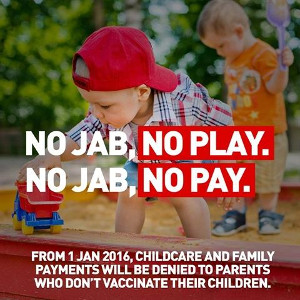Amended NSW legislation requiring child care centres to record the vaccination status of enrolled children has succeeded in reminding families of the need to keep vaccinations up to date.
However, there has been little if any impact on those families regarding themselves as ‘conscientious objectors’, or vaccine refusers.
These are the key results of research* conducted at child-care centres in the NSW Northern Rivers by a team that included Dr Sabrina Pit of the University Centre for Rural Health North Coast, and Marianne Trent of the North Coast Public Health Unit. Two of the 12 targeted child-care centres declined to participate in the study.
The research, published in the journal Public Health Research & Practice, was conducted in an area with one of Australia’s lowest vaccination rates and the highest number of refusers.
The national average for full immunisation of 5-year-old children is 91.5%, but postcodes around Byron Bay drop to just 66.7% of 5-year-olds being fully immunised.
The study said a similar localised trend had been noted in the US where growing anti-vaccination sentiment has seen parents vaccinating selectively or refusing vaccinations. This has led to “geographic clustering of unvaccinated children who have a higher risk of contracting vaccine-preventable diseases”.
The issue hit the news recently when a much-criticised film promoting anti-vaccination, Vaxxed: From Cover-up to Catastrophe, was pulled from the Tribeca Film Festival in New York. The film was directed by the discredited, former UK doctor Andrew Wakefield who wrote fallaciously of a connection between the measles, mumps and rubella vaccine with autism.
The researchers focused on the compliance of Northern Rivers child-care facilities in collecting evidence of complete vaccination or approved exemption before allowing a child’s enrolment. This requirement is in accordance with a recent amendment to the NSW Public Health Amendment (Vaccination of Children Attending Child Care Facilities) Act 2013.
While non-vaccinated children may still attend child care, a centre’s failure to record vaccination status makes it liable for prosecution. Having proper records means that as a precautionary measure non-vaccinated children can be excluded in the event of an infectious disease outbreak.
The children of parents with an approved Vaccination Objection form can attend childcare, but under the “No Jab-No Pay” provision are not entitled to receive the Centrelink benefits attached to vaccination. These benefits are the Commonwealth’s Child Care Benefit and Child Care Rebate, and the Family Tax Benefit Part A. Conscientious objection is no longer an exemption category for family vaccination requirements.
Marianne Trent said it was unlikely that the compliance effects of the No Jab-No Pay policy would be seen until at least the September 2016 data is recorded.
Interviews with centre directors showed they felt the NSW amendment was “a positive step in improving vaccination rates”, with its impact being largely complementary to other components of the vaccination policy.
The interviewees felt the change had been successfully implemented, and particularly fulfilled its aim of prompting parents who had forgotten to vaccinate.
This accords with comments by NSW Health Minister Jillian Skinner who said recording a child’s vaccination status is part of a “multifaceted approach to lifting the vaccination rate.”
The strategy includes school-based vaccination days for older children and community education programs.
However, the child-care centres believed the latest requirements had failed to significantly affect the vaccine refusers.





